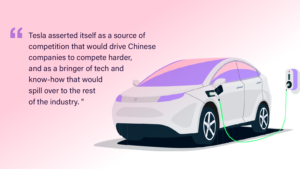
Business class, economy and the cargo hold
Since the term emerged in 2020, dual circulation has been the talk of the town. While China’s policymakers jostle to fit their own preferred economic policy pegs into this new hole, the European business community has questioned what the new theory means for their operations in China. European Chamber Senior Policy and Communications Manager Jacob Gunter walks us through aspects companies should keep in mind when trying to position themselves in the emerging landscape.
—————
At its core, ‘dual circulation’ is fundamentally a rebrand of China’s existing development strategy, albeit kicked into a higher gear than the approach taken by state planners over the last decade or so. Officially, it’s a shift in the Communist Party’s theoretical approach when discussing development goals, moving away from the ‘external circulation’ (export-orientated) growth model to one that adds more emphasis on ‘internal circulation’ (consumption-orientated). China has talked about boosting domestic consumption for a long time, but there are new differences that businesses would do well to take note of.
In their more pessimistic moods, China watchers and foreign business leaders have speculated that dual circulation is an attempt to build self-reliance and push foreign companies out of the country as it closes up again. There is a grain of truth in that, as we will get to later, but this view misunderstands what self-reliance means in China, and how it relates to the country’s market access regime and industrial policy. A better way to understand self-reliance, and with it dual circulation, demands examination of different industries and the ongoing and emerging trends in a broader context, as China’s policies seldom take sharp turns.
To oversimplify it a bit, let’s look at China’s chief market access regime changes in the last few years, as well as its signature industrial policy, China Manufacturing 2025 (CM2025).
Since 2017, China’s market access regime, mainly its Negative List for Foreign Investment, has loosened considerably in several industries. Most financial services have already been opened up, as have several manufacturing sectors like automotive and shipbuilding. Meanwhile, European and American chemical producers have made breakthroughs in finally getting the necessary approvals to invest in wholly foreign-owned plants.
At the same time, China’s CM2025 initiative has shifted in recent years. The scheme originally laid out bold ambitions to build dominant companies using state aid and worrying market share quotas, so that they could become cutting edge in ten critical sectors. In some industries, state planners clearly gave up, such as in new energy vehicles (NEVs), which saw subsidies dwindle and market access expand to bring in foreign competition. In others, especially in semiconductors, network equipment and much of the digital ecosystem, industrial policy has been reinforced.
These trends indicate that there are certain areas where China believes self-reliance would be best pursued by opening up to foreign companies eager to onshore particular technology, know-how and production. Meanwhile, there are other areas where foreign competition is viewed as a threat to the development of national champions, or considered unreliable due to expanding pressure imposed by foreign governments.
This puts most foreign companies into one of three categories, which the European Chamber outlined in its recent joint report with MERICS, Decoupling: Severed Ties and Patchwork Globalisation.
Business class

China is eager to onshore production in industries where it needs foreign technology, especially in areas upstream in value chains where disruption would limit the ability of Chinese companies further downstream to improve their production. Chemical producers are a good example of this. Without certain cutting-edge chemicals, China’s increasingly advanced manufacturers downstream simply cannot make certain products. While state planners would presumably prefer that foreign chemical companies bring that technology into China through a mandated joint venture (JV), they eventually realised that no sane CEO would agree, as that would amount to giving Chinese competitors company tech and know-how. As it is better to onshore production for the jobs and tax revenue, as well as resilience to trade disruptions like tariffs or export controls, the government may as well roll out the red carpet.
The same is true of financial services, with the government explicitly saying it needed foreign competition to help condition their local champions and to facilitate certain functions that Chinese banks struggle with, like cross-border services.
Economy class
In many sectors, policy-makers seem increasingly ambivalent about which nationality investors hold. Most business-to-consumer goods fall into this category. The reasoning is two-fold. First, any disrupted access to such consumer goods caused by political measures would only affect that specific product. That would be damaging to consumer expenditure, but far less harmful than lost access to business-to-business goods, which could ripple across multiple industries. Second, many consumers demand high quality European goods, regardless of whether imported or produced locally, so China may as well take the jobs and tax revenue that would come with the investment.
The automotive sector fits into the economy class perfectly. Chinese consumers want European cars, and especially higher-end ones. If a Chinese customer can afford a euro (EUR) 80,000 car, they are likely willing to pay the tariffs on an imported one. Having the cars produced in China employs not just the workers in the automotive plant, but also massive numbers of upstream employees hired by automotive component suppliers.
The cargo hold
In areas where market access restrictions remain and where industrial policy is extending massive support to local champions, foreign companies can expect the situation to worsen. The worst hit will be those in sectors most vulnerable to restrictions imposed by foreign governments. Look no further than the industries most targeted by and exposed to United States (US) measures for the best examples.
China’s network equipment companies, most notably in 5G, were hit hard by the US measures, which cut off market access to Chinese suppliers and also severed exports of American semiconductors. In the China market, there are no access restrictions on paper, but the pitifully low market share of European 5G companies suggests that the government is reserving market share for its own players, often under the guise of national security and protecting ‘critical information infrastructure’. As the US-China rivalry intensifies, this shows little sign of abating.

The digital ecosystem is another key example. Equity caps remain on value-added telecommunications services (VATS), which make up much of the digital foundation of the cloud, 5G and data management services ecosystem. Again, this is heavily linked to China’s desire to be able to go it alone if these kinds of services are cut off by foreign governments. As every sector undergoes digitalisation and these services become as important to competitiveness as access to a cutting-edge semiconductor, the impact of lost access could be amplified across much of the economy. As such, foreign VATS providers will have to contend with minority shares in JVs if they hope to overcome official barriers like the negative lists, or less official ones like government guidance for Chinese firms to integrate “secure and controllable” technology.
Therefore, when exploring what dual circulation means for their company, European business leaders would do well to first identify which category they fit into. If they have the right technology or know-how, they can likely anticipate a seat in business class with all the requisite perks. Those in non-contentious sectors, especially consumer goods, can expect to be welcomed and treated with benign neglect in economy class and be largely left to go about their business. Unfortunately, those in the contentious sectors where state planners insist on local champions dominating the market should prepare for conditions to worsen while they sit in the cargo hold and worry about being jettisoned out the back.
Finally, European companies in economy class or the cargo hold should look for opportunities to upgrade. Success in the China market has always been heavily dependent upon positioning a company on the right side of the policy agenda. American NEV producer Tesla did just that by positioning itself not as just another automotive manufacturer looking to sell to Chinese consumers. Instead, it asserted itself as a source of competition that would drive Chinese companies to compete harder, and as a bringer of technology and know-how that would spill over to the rest of the industry. The red carpet was rolled out with extensive support on offer in Shanghai, and Premier Li Keqiang himself attending the ground-breaking ceremony.
It may be harder to jump from the cargo hold to economy class, but if an American company could upgrade from economy to business class at the height of the US-China trade war, there may well be strategies to be found.


Recent Comments